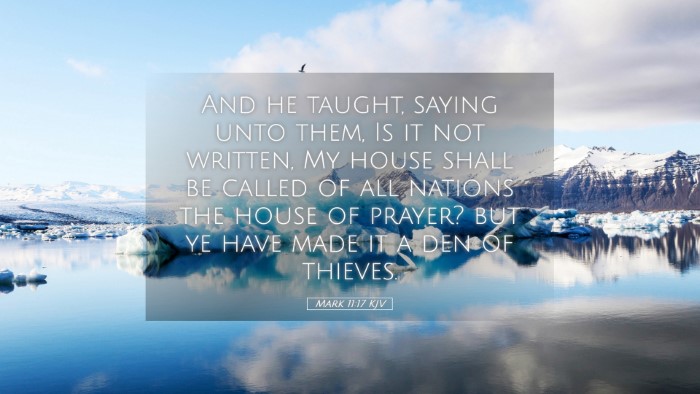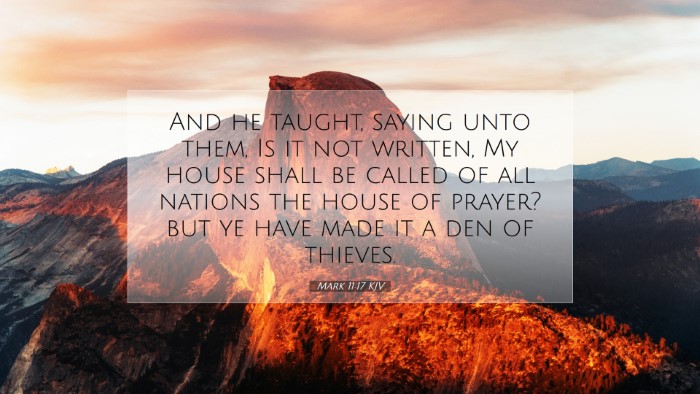Commentary on Mark 11:17
Verse Reference: Mark 11:17 - “Then he taught, saying to them, 'Is it not written: My house shall be called a house of prayer for all nations? But you have made it a den of thieves.'”
Introduction
In this pivotal verse, we witness an important moment in the ministry of Jesus, who addresses issues concerning the sanctity of the Temple. This part of Mark's Gospel highlights Jesus' righteous indignation and serves as a reflection on worship, prayer, and the commercialization of religion.
Contextual Background
The cleansing of the Temple occurs shortly before the crucifixion of Jesus. This context is crucial as it underscores the impending rejection of Jesus by the religious establishment. Mark places this event as a stark contrast to his growing popularity among the people. The Temple, which was meant to be a place of connection with God, had been corrupted by activities that detracted from its sacred purpose.
Exegesis of Key Phrases
- "My house shall be called a house of prayer for all nations":
- Divine Intent: This phrase reflects the original purpose of the Temple as a place of prayer, not just for Israel but for all people. It signifies the inclusivity of God's grace.
- Universal Worship: The reference to “all nations” anticipates the mission of the church and stresses that God desires worshipers from all backgrounds.
- "A den of thieves":
- Corruption of Worship: This stark rebuke underscores how the Temple's intent had been compromised. It hints at exploitation and greed among the religious leaders.
- Prophetic Fulfillment: Jesus quotes from Jeremiah 7:11, using familiar scripture to back his indictment, illustrating the continuity of God's message through the prophets.
Theological Insights
This verse raises critical theological considerations regarding the nature of worship and integrity in the church. It emphasizes that prayer and communion with God must not be overshadowed by commercial practices or exploitation.
Importance of Prayer
Jesus emphasized the importance of prayer. A "house of prayer" signifies that prayer is central to Christian life and community. The early church was known for devoting themselves to prayer (Acts 2:42), and this must continue to influence contemporary practice.
Rejection of Hypocrisy
By calling the Temple a "den of thieves," Jesus contends against hypocrisy and moral corruption. It is a reminder for pastors and leaders to maintain integrity, not allowing financial gain or personal ambition to cloud the mission of the church.
Social Justice Implications
Jesus' actions and words draw attention to issues of social justice within religious practice. The commercialization of faith often marginalizes the poor and vulnerable, challenging us to consider how church practices can uphold or undermine equity and justice.
Practical Applications
For contemporary pastors and theologians, this text offers insightful implications for modern church practices:
- Restoration of Worship: Churches must ensure that their activities and services are centered on authentic worship and prayer rather than commercial interests.
- Inclusivity in Evangelism: Embracing the missional aspect of the church, leaders should encourage outreach that welcomes all people, irrespective of their background.
- Ethical Leadership: Church leaders are called to model integrity and responsibility, guarding against practices that exploit congregants.
Conclusion
Mark 11:17 serves as a powerful critique of the misuse of religious spaces and practices. It is a call for reflection on the essence of worship, challenging believers to align with God’s intent for His house: a place dedicated to prayer, reflection, and justice for all. The implications for today's church are profound, inviting each member to consider how they uphold the values that Jesus proclaimed.


